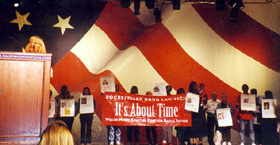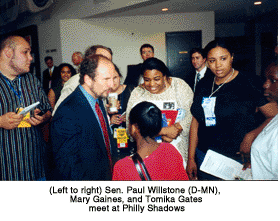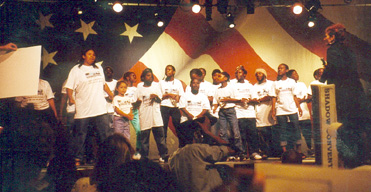 |

Children of the drug war doing their job
Center stage at Philly Shadow
By Chuck Armsbury, Senior Editor
 I was standing on the hot steps of the Annenberg Center
when Tomika said, "Chuck, we're doing what we came here
to do, aren't we?" I was standing on the hot steps of the Annenberg Center
when Tomika said, "Chuck, we're doing what we came here
to do, aren't we?"
"Yes, yes, we are," I answered. She really wasn't
asking me, she was telling me with a 'knowing' look in her eyes,
we really are getting a job done. That job was to tell the world
at Philadelphia's Shadow Convention in early-August about her
and other children's separation from mothers in prison, women
serving long sentences mandated by this heartless drug war.
Moments before, a visiting German journalist had interviewed
Tomika Gates while sitting on these outside steps. She told her
story to the world, repeatedly, that hot afternoon. The journalist
was shocked to hear that she has been raising five siblings and
two children of her own since she was sixteen. At age 22 she's
still taking care of siblings, her own two children, attending
school and missing her imprisoned mother.
 Tomika and twenty-nine other young people, including
toddlers, visited Philly's Shadow Convention to help dramatize
and make real the devastation to black families caused by the
racist drug war. November Coalition teamed with St. Paul's Federal
FORUM, Detroit's Women of Action and regional leader, Kelly Ali
of Cleveland, Ohio to bring children by bus, children from each
city, young people with chilling stories of childhood poverty
and parents or relatives in prison. Tomika and twenty-nine other young people, including
toddlers, visited Philly's Shadow Convention to help dramatize
and make real the devastation to black families caused by the
racist drug war. November Coalition teamed with St. Paul's Federal
FORUM, Detroit's Women of Action and regional leader, Kelly Ali
of Cleveland, Ohio to bring children by bus, children from each
city, young people with chilling stories of childhood poverty
and parents or relatives in prison.
This was no small effort. The Shadow organizers called on
November Coalition, FAMM and the Kunstler Fund for Racial Justice
of NY, to show the nation in plain, human terms how the drug
war has particularly devastated black American families. With
little time to organize, TNC called Mary Gaines of FedFORUM who
then called Mattie Thomas of Women of Action, two former drug
war prisoners, long-time friends and united in desire to foster
the often tenuous relationship between women in prison and their
children.
FedFORUM, in particular, offers support services which include
a family transit system to carry children in the St. Paul area
to Pekin, Illinois for visits with their mothers confined in
the federal women's camp. A trip to Philadelphia would be a longer
journey yet, an adventure in grassroots politics, a huge opportunity
for expression of their special oppression.
Thanks to Mattie in Detroit, a tour bus with driver was hired
to take children and chaperones from Detroit to St. Paul, pick
up Mary and her group, and then motor on to Philly in time to
appear on the Annenberg stage by Tuesday, August 1st. Kelly drove
her small group of three all night from Cleveland for an early
morning arrival.
The children were billed in Shadow promotional literature
as a "choir" from Minnesota. What TNC suggested, originally,
was not a "choir" at all, but, rather, a mixed group
of young people singing, People get ready, a popular 1960s song.
Ah, the magic of it. Yes, we did present a "choir"
to the large Shadows' audience, complete with poetry readings
between songs thanks to Donnie Blecher's writing talent and the
arrangement of New York City's Jillian, a professional vocalist.
Our children of the drug war, our "choir", stayed
with us at a Drexel University dormitory arranged for our three-day
stay by Shadow organizers. A small, neighborhood restaurant fed
over 30 of us, children plus adults, good meals. We greatly appreciate
this Greek couple who patiently planned the food schedule with
us with no previous notice given for those days we streamed in
and out of their restaurant.
A Philly neighborhood church provided two of our meals. At
one of our meals there, CNN was filming church leaders and dignitaries
for live broadcast to the Republican Convention. We meandered
to the basement with "our brood" amidst secret service
agents and celebrities. It was surreal, all that security, and
for our group, a bit strange.
Jillian arrived by train from NYC on Monday, July 31st, about
Midnight. We held our first successful 'choir practice' at 2
a.m. Other than keeping other residents awake and having to placate
dorm security, we sang, or the children sang. Jillian or Jill
Armsbury, my daughter, led dead-eyed, tired children into a passable
rendition of People Get Ready.
On Tuesday, August lst, the Annenberg Center was jammed with
press plus a full house of drug law reformers. The children were
on stage before Jesse Jackson's speech. The place was rockin'
after Rev. Sanders condemned the drug war in the opening benediction
momentum continued to build.

That's when the children came on stage. Dave Borden of DRCNet
may have described the presentations best, saying, "Later,
the Children's Choir, composed of Minnesota children of drug
war prisoners, brought some in the audience to tears, not because
of its dissonant performance, but at the human suffering and
perseverance it represented."
Teenage Donnie Belcher of St. Paul read two of her own poems
aloud, chilling listeners into sad silence for the shame of it
all - the filthy drug war, its many young victims. You had to
have been there to appreciate such beautiful dissonance.
Our children were interviewed successive times by many journalists.
They told wrenching stories for radio broadcast later in Philadelphia,
and some took part in a live television broadcast by Democracy
Now. Others were taped and excerpts broadcast as TNC's Nora Callahan
and Deborah Small of the Lindesmith Center joined live radio
hosts Elizabeth Robinson and Norman Solomon of the National Radio
Project. Reporters from the Minneapolis/St. Paul area wrote feature
articles for the Star-Tribune about these young travelers, and
their message spread far and wide.
It was a job well done, as Tomika observed. The message got
out. Senator Paul Wellstone of Minnesota spoke at the Philly
Shadows, afterward spending a half-hour talking with Mary, Mattie
and the children, promising to meet with them "back home".
Aides from U.S. Congressman John Conyers' (Michigan) office spoke
with us later, praising the children for their powerful presentation
and encouraging us to bring them to Washington DC in the future
where they could tell their stories to other congressional members
and staff.
We've learned from both Mary and Mattie that many of the youth
were inspired to have new confidence in themselves. Most had
never spoken publicly about the incarceration of their loved
ones; many since have pledged to be active with their peers and
communities. Despite bus problems, hot, humid weather and a grueling
schedule for such a large group of children - the compelling
stories of the drug war victims were voiced, heard, honored.
Thank you, everyone, chaparones, kids and Shadow organizers,
for the great success of our Shadows journey. Thank you children
for sharing your stories, your love and for inspiring many others
to make this world into a better place.

|